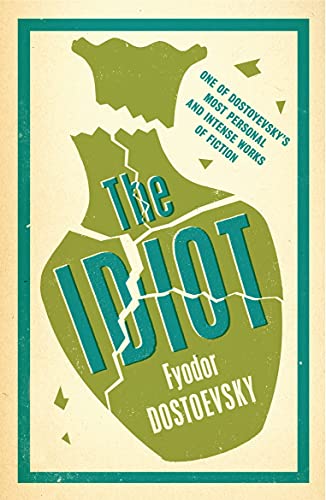The Idiot
New Translation (Evergreens)
Fyodor Dostoevsky
BOOK REVIEW

In the realm of literature, few authors manage to hypnotize readers with the depth of their psychological insights like Fyodor Dostoevsky. With The Idiot, you are thrust into a labyrinth of human emotions, moral dilemmas, and the piercing light of truth. This work is not merely a book; it is a mirror reflecting the heart's innermost longings, fears, and contradictions. Are you ready to encounter the world through the eyes of Prince Myshkin, the so-called "idiot" whose purity and innocence challenge the very fabric of a corrupt society?
The narrative opens in a tumult of societal expectations and existential questioning. Myshkin, the protagonist, returns to Russia after years abroad in a sanatorium. From the moment he steps onto the train, the air crackles with tension, and you can almost hear Dostoevsky whispering secrets of the soul. The prince, marked by a genuine goodness that seems almost alien in this world, becomes a canvas onto which others project their fears, desires, and betrayals. With each encounter-from the seductive Nastasya Filippovna to the ambitious Rogozhin-you find yourself ensnared in a web of fate, passion, and profound human vulnerability.
Critics have lauded The Idiot for its intricate narrative structure and the complexity of its characters. Some readers are drawn to Myshkin's Christ-like idealism, recognizing a tragic hero whose earnestness stands in stark contrast to the cynicism that permeates society. Others, however, criticize the pacing and feel overwhelmed by the novel's philosophical musings. But perhaps therein lies the truth's essence-it's raw, uncomfortable, and deeply reflective of our intrinsic conflicts. You may find yourself exhausted, yet exhilarated, as you navigate the emotional terrain Dostoevsky lays before you.
Dostoevsky composed this work during an era rife with political upheaval and existential dread, echoing the tumult of 19th-century Russia. The backdrop of societal change, chaos, and burgeoning nihilism informs every page, inviting us to examine our moral compasses. Myshkin's struggle transcends his narrative; it resonates through generations, influencing writers such as Gabriel García Márquez and Franz Kafka. They, too, grappled with the human condition, seeking to uncover the delicate balance between hope and despair.
What makes The Idiot so compelling is not just the narrative but the psychological depth etched into every character. Dostoevsky plunges deep into the emotional abyss, crafting characters that embody our darkest fears and highest aspirations. When you delve into the minds of Rogozhin, Nastasya, or even the steadfast Aglaya, you feel their pain, their yearnings, their very essence. It is as if you are participating in a grand existential ballet, where each character dances to the rhythm of their own fate.
As you turn each page, prepare to confront your own ideologies and moral standing. Does Myshkin symbolize the hope that goodness can triumph over evil? Or is he a fool, lost in a world that cannot comprehend his purity? The question lingers, haunting your thoughts long after you close the book. Reflecting on the reader reviews, many express an emotional upheaval born from Dostoevsky's unflinching portrayal of humanity. Some readers have described it as a journey that left them both enlightened and heartbroken-a bittersweet reminder of the complexities we all navigate in our lives.
Through this extraordinary tale, The Idiot compels you to question your reality, to dissect your beliefs. It invites you to ponder if innocence can ever exist in a world where selfishness reigns. Dostoevsky is not merely presenting a narrative; he's crafting an experience, stirring your emotions into a tempest. You may feel the sting of despair while simultaneously basking in the light of hope, a delicate juxtaposition that defines our very existence.
In the end, abandoning The Idiot isn't just closing a book; it's leaving a world that resonates far beyond its pages. Each character's voice whispers long after you've turned the last page, echoing a challenge to embody the very ideals Myshkin represents. Will you dare to embrace this journey through the labyrinth of human emotion, or will you close the door, forever pondering what lies on the other side? The choice is yours, but heed this warning: the truth, raw and provocative, awaits you in Dostoevsky's masterpiece. 🌌
📖 The Idiot: New Translation (Evergreens)
✍ by Fyodor Dostoevsky
🧾 704 pages
2014
#idiot #translation #evergreens #fyodor #dostoevsky #FyodorDostoevsky